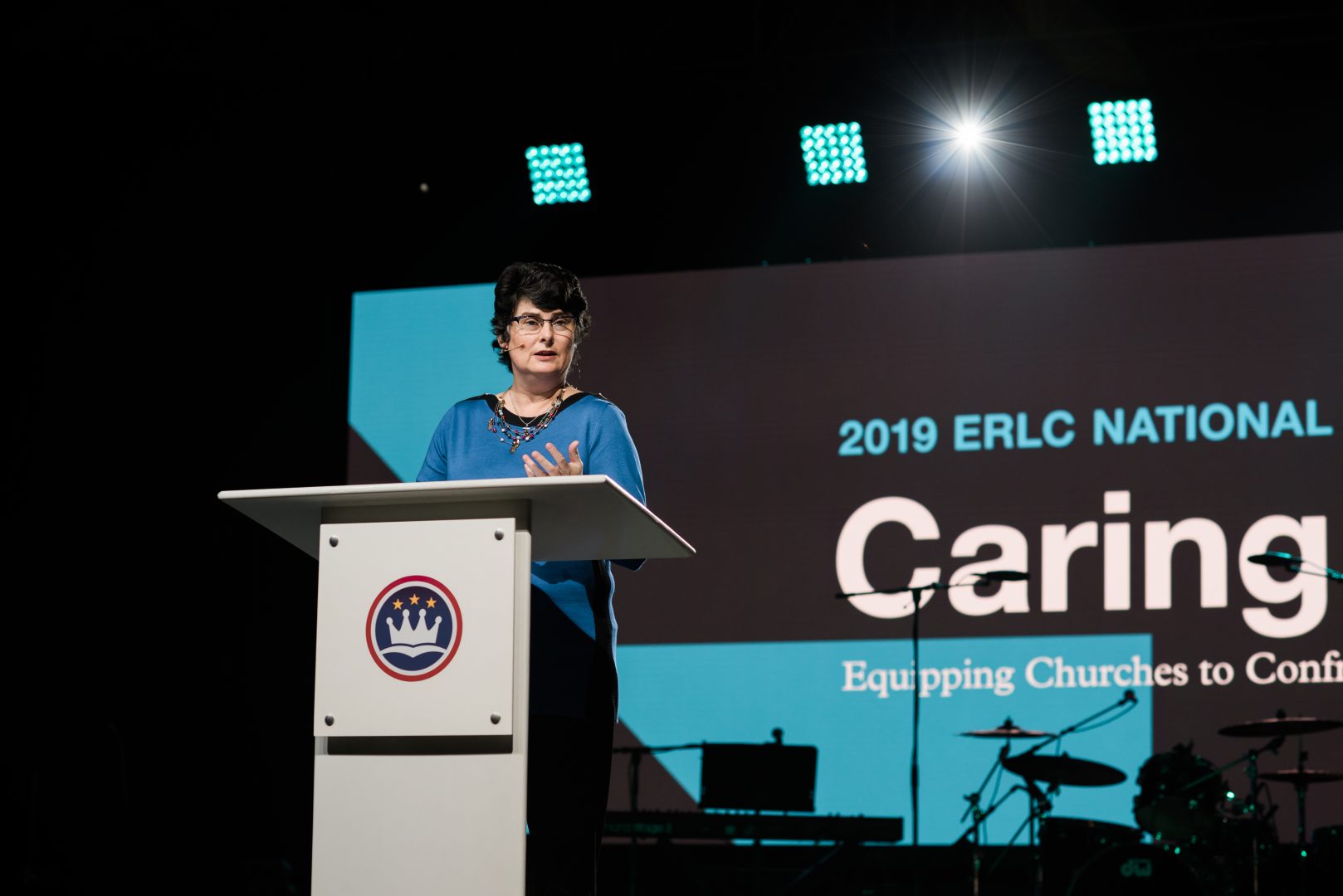
At the 2019 ERLC Caring Well Conference, I shared 10 requests from my perspective of an SBC sexual abuse survivor. I’ve included my requests, expanded with commentary in order to help guide your thinking as you care well for trauma survivors.
1. Acknowledge that many adults in your churches have experienced trauma.
 |
The Centers for Disease Control estimate that one in three women and one in four men have experienced sexual violence. In your congregation, this equates to 33 percent of your female members and 25 percent of your male members. Sexual abuse is a dominant form of trauma, but many adults have experienced physical, emotional, domestic and spiritual abuse. My conservative estimate is that at least half of your membership has a significant trauma background. Understand that trauma is widespread in your congregation, and commit to care well for them.
2. Understand that what may look like spiritual apathy is really spiritual disconnection because of trauma, and respond accordingly.
Research helps here. A 2017 study in the journal Mental Health, Religion, and Culture reports that between 52 percent and 67.3 percent of American adults report at least one adverse childhood event – a traumatic event occurring in childhood. That would be over half of your congregation. A 2018 study in the Journal of Human Behavior in the Social Environment states that complex childhood trauma causes long-term neurobiological changes that alter our brain function. The Mental Health, Religion, and Culture study reports that across our lifespan, those of us with trauma backgrounds experience a decline in the strength of our beliefs or our overall commitment.
What’s the takeaway here? Trauma interrupts both our spiritual development and brain function. Are you discouraged by those in your church who don’t connect? This research says they may be managing trauma. Instead of disinterest, it is a disorder. Rather than apathy, it is adversity. These are medical effects that deserve your investment into their lives, not your frustration.
3. Treat mental health with the same priority as we do traditional physical health problems.
When I dealt with the worst of my trauma recovery in my 20s and 30s, I realized in Sunday School that my most urgent prayer requests were not socially acceptable. The best I could muster was an “unspoken.” I’ve since wondered where unspoken prayer requests are in the Bible. The answer? They’re not there. “Unspoken” requests often arise from shame.
Many churches are not yet free of stigma for mental illness. Over half of your congregation may suffer, but they check their need at the front door as shameful baggage. To change this dynamic, discuss mental health boldly. Preach it from the pulpit. Teach it from the podium. Strip the shame and stigma. Flip the narrative, and make your church a safe space to discuss what is still hard to describe. We should feel as free to ask for help for depression or bipolar disorder as we do for cancer. Changing this narrative will save lives.
4. Enact safeguards.
Just as you have adults watching the children, someone should watch the adults. More predators exist inside your church than lurk outside. Look for grooming patterns and indicators of preferential abuse, like giving gifts to children or consistently volunteering with the same age group. If your staff is all male, ensure that a woman is trained and in place as a person an abused child or adult can go to for help. A child who has been abused by a man needs a caring woman to intervene. The best way to keep a child from a lifetime of pain after abuse is the intervention of a safe, caring adult. The Caring Well Curriculum will help you understand how to safeguard your church and use the right caretakers well.
5. Use the right words. It’s not someone’s bad judgment or “a health problem.” It’s a felony.
We must name abuse correctly. Common labels include “reaction to stress,” “poor judgment,” and even “sex with a girl.” No. Sexual abuse is a felony; domestic violence is a felony; and nonconsensual sex is rape and a felony. Rather than shading it with labels, call it what it is – a crime.
6. Take care of those who have been abused by taking responsibility for their spiritual healing.
We are responsible for the Great Commission – to share the good news of Jesus Christ with the world. This good news includes the healing power of Christ. For too long we have stopped short of sharing all of the Good News. We have focused on getting others saved from their sins, but not saved from the ravages of the sins of others. We’ve helped assure their salvation, but left them to fester in their pain. Evangelism demands that we present Christ as Savior and also as Counselor and Healer. Our responsibility goes beyond checking off the Romans Road. True evangelism leads to discipleship that brings the healing power of Christ to others.
7. Report abusers to the police, no matter who they are or how much influence they wield, and get them out of ministry. Remove their enablers as well. Theirs is a secondary evil.
When abuse occurs, it is not your job as a church to investigate. It is your mandate to report the crime to civil authorities. The Caring Well Curriculum will explain how, but the first step is to call 911. If a children’s minister who molested a child had shot that child instead, you would not decide to investigate if a crime had occurred. You are not an investigator or a rehabilitator of the offender. Report the crime. Remove the abuser from ministry. And if someone tries to protect the abuser, remove that person as well.
8. Change the culture regarding mental health in our evangelical world.
How do we change a culture? Act on your conviction that a large segment of the Church is being overlooked. Raise your voice to advocate for mental health. Encourage leaders to use their power to openly discuss mental health. Imagine the power of a pastor who preaches on depression and bipolar disorder and how it enables small groups to be able to discuss these disorders and pray for others with openness and boldness. Flipping a culture begins with the convictions of a few, is then seized upon by leadership as essential, and spreads until it is normalized. Rick and Kay Warren of Saddleback Church are great examples of culture-changers regarding mental health. Let’s follow their model in all of our Southern Baptist churches and normalize mental health.
9. Listen and then be willing to talk. The silence from the churches in my life has been deafening.
When a survivor comes forward to discuss abuse at any age, listen. Let him or her speak. When the survivor has exhausted himself or herself of the story, then talk. Our tendency is to talk first and to reassure. My friend Chris Davis, senior pastor of Groveton Baptist Church in Alexandria, Virginia, wrote recently in his article Empathy: 5 Tips for Taking the Plunge, “Instead of assuaging our own discomfort or theirs with solutions or silver linings, we should remain present with the person in their emotions. This may require long, potentially uneasy stretches of silence as they put words to their experience. We ask questions to work toward what is really happening in their heart, even if the answer reveals more mess or deeper pain.”
Remain present with the survivor in the uneasy silence. Let the survivor set the boundaries on what to share and when. We deserve your time and willingness to let us be the owners of our stories. Once you’ve listened, talk with the survivor. Later, preach the effects of abuse from the pulpit. Over half of your congregation is waiting for you to listen and then speak.
10. Do not be afraid of those of us who’ve experienced trauma. Our stories are messy, but embrace us and you will embrace our Savior who suffered.
As a survivor, even I feel reluctant sometimes to get involved in the recovery process of someone else. Recovery is messy, awkward, and lifelong. Reluctance is normal, but fear is a mismatched response. Don’t be afraid of us. When God accelerates our healing through connected believers, we become some of the most powerful servants of God in the Church. We have suffered and come through it to help others. We’ve seen both evil and God’s power up close. Run to our pain, not away. Serving us will become one of the greatest gifts God has given you and may be an amazing way God, in turn, serves your church.
As a survivor, I believe I have earned the right to ask you to consider my 10 requests, all in the goal of making our churches a healing refuge, safe and restorative for all. When we can reach unbelievers, then provide a safe environment for worship and discipleship, and also actively restore those who have suffered trauma to a vibrant relationship with God, we will know that we are following the leadership of Jehovah-Rapha, the God who heals.
(EDITOR’S NOTE – Susan Codone, Ph.D., is a professor of Technical Communication at Mercer University School of Engineering. This article was originally published at erlc.com. Reprinted with permission.)


